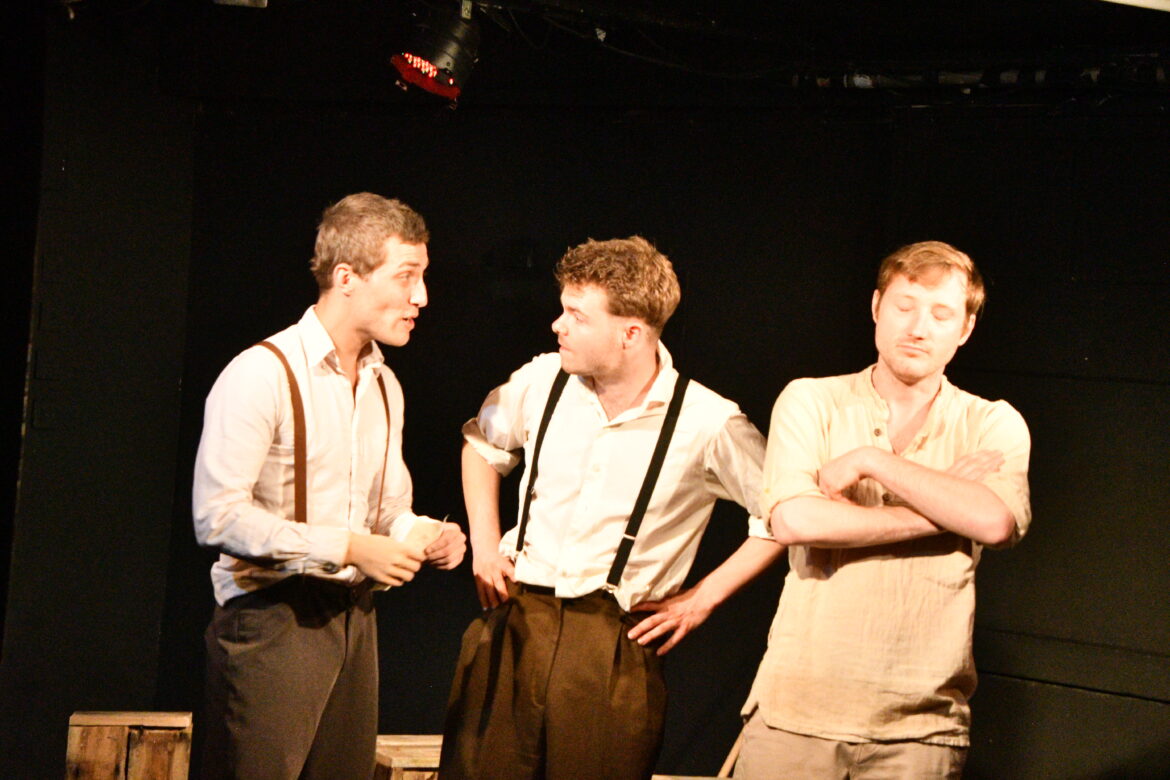Review by Simon Jenner, May 25 2025
How many different kinds of duty are there in a war? There’s few plays about World War One set on a farm. And fewer about Sussex, with those who joined the Royal Sussex Regiment, and those who didn’t. Using primary source material, Suse Crosby has written her third play Duty absorbing these stories, melded into one. It plays in The Lantern Theatre also directed by Crosby till May 25th.

Jake Marchant, Jordan Southwell. Photo Credit: Peter Williams
In crafting this one-hour drama full of reflection and argument rather than events, Crosby’s picked a superb quartet of actors. It’s August 1914. The young farmer John (Matt Vickery) is nonplussed when his two farmworkers, in reality friends, don’t show up till late. Vickery’s John seems already shadowed with premonition as the play opens. The pair have been at the square hearing all about the war. They’re distinct, from each other and John. Easily-led, naïve Harry (Jordan Southwell, consummate in Harry’s blathery incomprehension) and shrewder measured Joe (Jake Marchant, whose stillness, parrying and mediation as Joe is memorable).
Vickery’s John is both anxious for his friends and contemptuous of war. It’s the first of several scenes where he tries persuading his friends against joining up. They then reverse this tactic on him, when call-up is imminent, around January 1916. John’s pacifism has been learnt paradoxically off his career soldier father, who had a change of heart in the Boer War. No farmer himself, he’d died leaving John possessor of his uncle’s farm.
John’s a thorough pacifist, religious but not churchy, believing killing is wrong and the church is wrong for changing its mind. And who’ll feed Britain if only lame and elderly farm-workers are employed? Every argument is countered by his arguing the humanity of Germans they know in the town. Harry’s muddle of “bad” Germans – those who join their army – is soon dispatched. Joe’s more intelligent but feels ultimately, Germany’s the aggressor and it’s the ruling powers responsible. In a series of alternating tableaux the same arguments are thrashed as war itself darkens and torques them.

Mat Vickery, Sam Nixon. Photo Credit: Peter Williams
“They also serve who only stand and wait” might be Mags’ motto, but it’s John’s too, even if serving the community comes before any service in war.
Crosby’s supplied a box and minimal props like a hoe, but more on two uniforms with peaked caps changed at one point for helmets and rifles. Red lighting suffuses Joe’s narrative of how the two went over the top at the Boar’s Head, where the Royal Sussex tried relieving the impasse of the Battle of the Somme to their north, in July 1916. There might have been more varietal lighting elsewhere to shade the crucial feature of one narrative, to lead the audience subliminally. This is a first run, and its next will refine in small ways an already compelling narrative.
A fresh and urgent play, Duty should tour as a salutary reminder of how war impacts community, divides war-influenced majority from the few who see through war; and what it does to semi-rural communities.
Production Photography Peter Williams. Sound and Light Operator Erin Buckeridge, Suse Crosby.
Jake Marchant, Jordan Southwell Peter Williams



